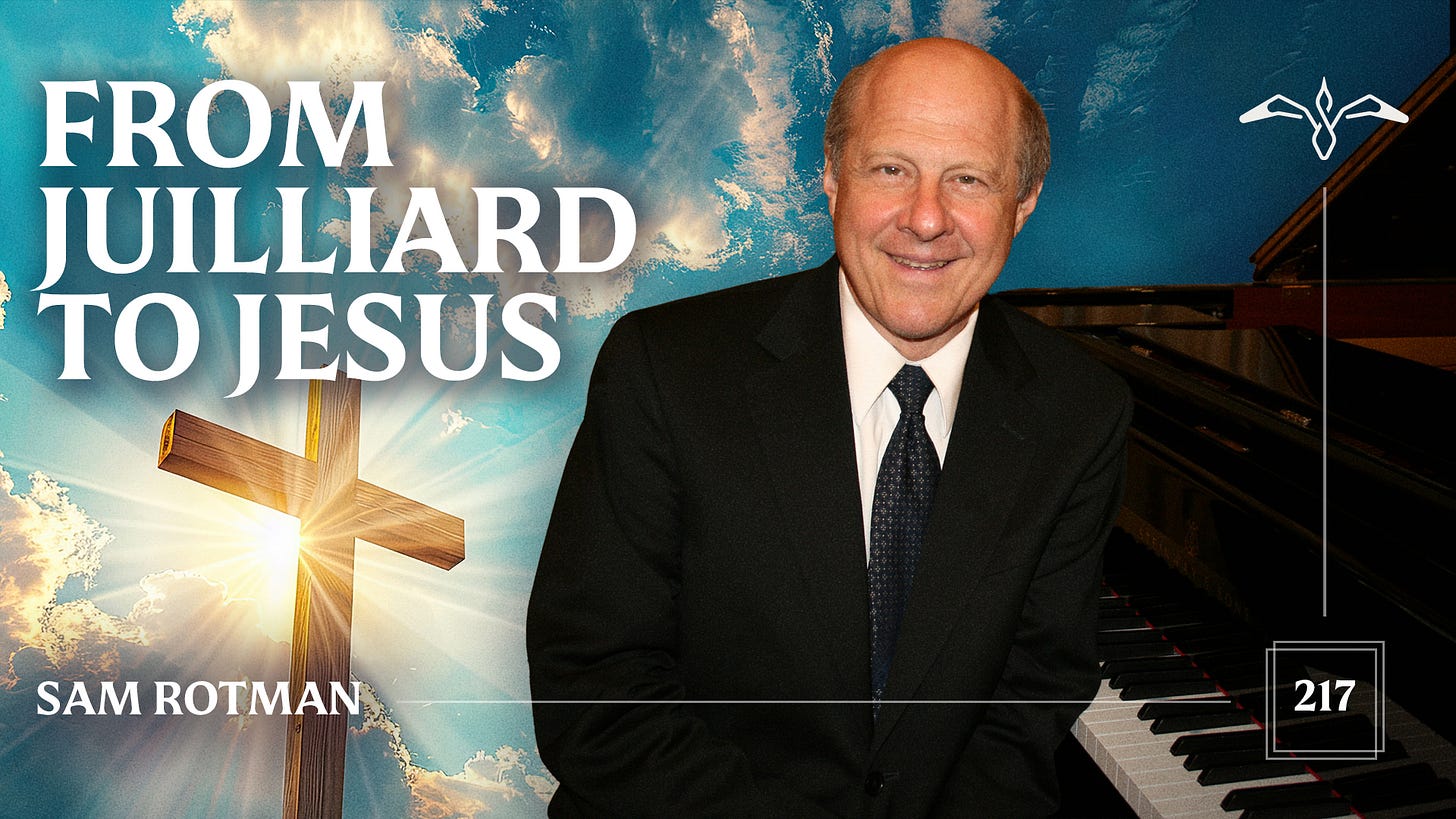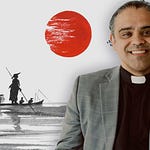I had the privilege of sitting in Sam Rotman's piano room, surrounded by decades of musical achievement, awards, and memories from a life lived on stages across the globe. But what struck me most wasn't the impressive collection of accolades or even the beautiful grand piano where he's practiced for decades. It was the simple wooden cross prominently displayed, bringing meaning to everything else in the room.
Sam's story reads like something from another era. Born to Orthodox Jewish parents who fled Europe during the Holocaust, raised in intense religious devotion with Hebrew school five days a week for eight years, and then accepted to the prestigious Juilliard School where he practiced 10 hours daily. By age 16, he was performing with symphony orchestras before audiences of thousands.
The Juilliard Encounter That Changed Everything
In 1970-71, during his third year at Juilliard, Sam encountered three students who called themselves "Born Again Christians." He'd never heard that term before, but something about these musicians was different. They weren't talking about church or Christianity - they were obsessed with Jesus. Every conversation, every break from practicing, every meal seemed to center on this person they called Jesus Christ.
What happened next still gives me chills. These students asked Sam two simple questions: Had he ever read the New Testament? And could Jesus be the Messiah the Jews were waiting for? For someone who had memorized hundreds of Hebrew prayers and studied religious texts for years, admitting he'd never even touched a New Testament was humbling.
Eight Days That Transformed a Life
Sam made a decision that would change everything. He would read this book for himself. What followed was eight days of complete absorption - no practicing, no routine, just reading and re-reading the New Testament. The man who described Jesus as "the light of the world" and claimed that "no one comes to the Father except through me" initially struck Sam as a lunatic. But something kept drawing him back to those pages.
On May 21, 1971, in apartment 4B at 119 West 71st Street, Sam Rotman prayed a prayer that instantly transformed him. The foul mouth he'd struggled with was cleaned. The dirty mind was changed. The self-centeredness was replaced with something entirely new. He woke up the next morning knowing he was a completely different person.
Excellence as Evangelism
What I found most compelling about Sam's story is how his conversion didn't diminish his musical excellence - it gave it new purpose. He still practices 6-7 hours daily at age 74. He's still learning new pieces and accepting challenging performances. But now he plays for an audience of One who never misses a concert.
This shift in motivation has taken Sam to places no career-focused pianist would ever consider. He's played on hotel lobby pianos in countries that only had one piano in the entire nation. He's performed in jungle villages on electronic keyboards. He's stayed in people's homes instead of luxury hotels, carried Beethoven's death mask around the world, and given his testimony in 62 countries.
The key insight Sam shared resonated deeply with me: "When you can play the piano like that, you've earned the right to stand up and tell me what is the most important thing in your life." Excellence creates platform. Mastery earns credibility. And credibility opens doors for the gospel that talent alone never could.
The Cost of Following Jesus
Sam's conversion came with serious consequences. His father, a Holocaust survivor, told him he was no longer his son and refused to see him for years. Sam wasn't invited to his own father's funeral. Most of his extended family relationships were strained or severed. In professional circles, he became known as "the Jesus pianist" - sometimes as a compliment, sometimes not.
But Sam also shared the beautiful story of his mother's conversion at age 91, after 36 years of prayer. And he maintains close friendships with the three Juilliard students who first introduced him to the New Testament over 50 years ago.
Living for Eternity
As our conversation concluded, Sam played the first movement of Beethoven's first piano sonata. Listening to those notes fill his practice room, I was struck by the integration of his life. This isn't compartmentalized faith - this is someone who has found what the Puritans called his "chief end" and ordered everything else around it.
Sam Rotman's story challenges anyone pursuing excellence in any field. Are we working just for personal achievement, or have we found something worth giving our lives to? Are we willing to play on any piano, stay anywhere, go wherever our mission takes us? And most importantly, have we discovered that only Jesus Christ can actually change a human heart?
In a world obsessed with platform-building and personal branding, Sam offers a different model: excellence in service of something eternal, talent submitted to divine purpose, and a life that treats every performance as an act of worship.
Key Discussion Points:
The eight-day period in 1971 when Sam read the New Testament and experienced conversion
How practicing 10 hours daily at Juilliard prepared him for a lifetime of musical excellence
The family consequences of his conversion, including his father's rejection and mother's later salvation
His philosophy of playing "on any piano for Jesus" - from concert halls to jungle villages
The significance of traveling with Beethoven's death mask during the 250th anniversary celebrations
How excellence in classical music creates platforms for gospel ministry in secular venues
The integration of faith and professional life without compromising artistic standards
His approach to preparation: playing each piece 50 times for his wife before public performance
The difference between religious activity and genuine heart transformation through Christ
Why he describes himself as "a speck of dust with air pumped in me" despite world-class achievements
The role of his wife as essential support in his 51-year marriage and career
His ongoing practice routine at age 74 and commitment to continuous improvement
The providential encounters that led to his conversion and sustained his ministry
How his Jewish background and Holocaust family history informed his decision to follow Jesus
The balance between humility and excellence in Christian artistic endeavors
His experience receiving an honorary doctorate from Master's University
The practical aspects of maintaining excellence while serving in humble circumstances
His perspective on being known professionally as "the Jesus pianist"
The theological significance of the cross as the central symbol in his practice room
His advice for young Christian artists pursuing excellence in their craft
Timestamps
[00:00:36] Introduction and Sam's impressive credentials
[00:01:32] Sam's Orthodox Jewish background and family Holocaust history
[00:04:25] Meeting Born Again Christians at Juilliard in 1970-71
[00:07:37] Reading the New Testament and spiritual crisis
[00:11:02] Conversion experience on May 21, 1971
[00:12:14] How Sam's playing changed after conversion
[00:16:35] Playing for Jesus versus playing for fame
[00:23:00] Japan piano heaven experience
[00:30:39] Family consequences of conversion - father's rejection
[00:35:31] Being known as "the Jesus pianist"
[00:40:17] Gift from Irish conservatory director
[00:42:00] Honorary doctorate from Master's University
[00:48:39] Beethoven competition and specialization
[00:54:06] Traveling with Beethoven's death mask
[01:02:16] The cross as the central symbol
Connect with Sam Rotman
Website: https://samrotman.com













Share this post